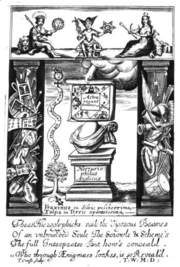
Fasciculus Chemicus
Encyclopedia

Alchemy
Alchemy is an influential philosophical tradition whose early practitioners’ claims to profound powers were known from antiquity. The defining objectives of alchemy are varied; these include the creation of the fabled philosopher's stone possessing powers including the capability of turning base...
writings compiled by Arthur Dee
Arthur Dee
Arthur Dee , the eldest son of Dr John Dee, was a physician and alchemist.He was the eldest son of John Dee, by his second wife, Jane, daughter of Bartholomew Fromond of East Cheam, Surrey, and was born at Mortlake on 13 July 1579. He accompanied his father in travels through Germany, Poland, and...
(1579–1651) in 1629 while resident in Moscow
Moscow
Moscow is the capital, the most populous city, and the most populous federal subject of Russia. The city is a major political, economic, cultural, scientific, religious, financial, educational, and transportation centre of Russia and the continent...
as chief physician to Czar Mikhail Romanov, founder of the Romanov
Romanov
The House of Romanov was the second and last imperial dynasty to rule over Russia, reigning from 1613 until the February Revolution abolished the crown in 1917...
dynasty (1613–1917).
Fasiculus Chemicus was revised by Dee sometime between 1631 and 1633 and translated from Latin into English by Elias Ashmole
Elias Ashmole
Elias Ashmole was a celebrated English antiquary, politician, officer of arms, astrologer and student of alchemy. Ashmole supported the royalist side during the English Civil War, and at the restoration of Charles II he was rewarded with several lucrative offices.Ashmole was an antiquary with a...
in 1650 under the anagrammatic pseudonym of "James Hasholle" (by substitution of the letter J for I). However, Dee was displeased with Ashmole's translation, and wrote to him:
- I am sorry you or any man should take pains to translate any book of that art into English, for the art is vilified so much already by scholars that do daily deride it, in regard they are ignorant of the principles. How then can it any way be advanced by the vulgar? But to satisfy your question, you may be resolved that he who wrote Euclid's Preface was my father. The 'Fasciculus', I confess, was my labour and work.
Arthur Dee's principal sources in his alchemical anthology include Petrus Bonus
Petrus Bonus
Petrus Bonus Lombardus was a supposed fourteenth century physician at Ferrara, and writer on alchemy. He is best known for the attribution to him of Margarita preciosa novella, from around 1330, an influential alchemical text. His supposed Introductio In Divinam Chemicae Artem was much later...
, John Dastin
John Dastin
John Dastin was an English alchemist of the fourteenth century. Nothing is known of his life beyond the texts which are attributed to him ....
, Gerhard Dorn
Gerhard Dorn
Gerhard Dorn was a Belgian philosopher, translator, alchemist, physician and bibliophile.-Biography:The details of Gerhard Dorn's early life, along with those of many other 16th century personalities, are lost to history. It is known that he was born about 1530 in Mechelen, which is part of...
, Raymund Lull
Ramon Llull
Ramon Llull was a Majorcan writer and philosopher, logician and tertiary Franciscan. He wrote the first major work of Catalan literature. Recently-surfaced manuscripts show him to have anticipated by several centuries prominent work on elections theory...
, Michael Maier
Michael Maier
Michael Maier was a German physician and counsellor to Rudolf II Habsburg, a learned alchemist, epigramist and amateur composer.- Biography :...
, Laurentius Ventura and Evavadus Vogelius.
Arthur Dee lists the stages of the alchemical opus in Fasciculus as ten in number-
1. Natural Matter 2. Preparation 3. Weight in preparation 4. The philosophers Fire, what?
5. The Rise or birth of the Stone 6.The Weights of 2nd Work 7. Imbibition 8. Fermentation
9. Projection 10. Multiplication
During the 1650s an easing of regulations on the licensing of printing-presses and the subject-matter of leaflets, pamphlets and books occurred. This allowed the newly-liberalised printing presses of the Protectorate of Oliver Cromwell
Oliver Cromwell
Oliver Cromwell was an English military and political leader who overthrew the English monarchy and temporarily turned England into a republican Commonwealth, and served as Lord Protector of England, Scotland, and Ireland....
to cater to the reading public's fears and speculations on England's future. The revival of interest in alchemy in Britain was primarily due to the social uncertainties engendered by the social trauma of the Civil War
English Civil War
The English Civil War was a series of armed conflicts and political machinations between Parliamentarians and Royalists...
, the execution of King Charles I
Charles I of England
Charles I was King of England, King of Scotland, and King of Ireland from 27 March 1625 until his execution in 1649. Charles engaged in a struggle for power with the Parliament of England, attempting to obtain royal revenue whilst Parliament sought to curb his Royal prerogative which Charles...
and the establishment of the Commonwealth and Protectorate.
Dee's anthology was in the vanguard of a revived interest in alchemy in Britain throughout the 1650s, the foremost publication being Ashmole's major edition of British alchemical literature, Theatrum Chemicum Britannicum
Theatrum Chemicum Britannicum
Theatrum Chemicum Britannicum first published in 1652, is an extensively annotated compilation of English alchemical literature selected by Elias Ashmole. The book preserved and made available many works that had previously existed only in privately held manuscripts...
(1652). A manuscript copy of Fasiculus Chemicus is listed in the Library of Sir Thomas Browne
Library of Sir Thomas Browne
No single document gives better evidence of the erudition of Sir Thomas Browne, physician, philosopher and encyclopedist than the 1711 Sales Auction Catalogue of the Library of Sir Thomas Browne...
.
Source
- Fasciculus chemicus of Arthur Dee; translated by Elias Ashmole; edited by Lyndy Abraham. Published by Garland Press, N.Y., December 1996.

